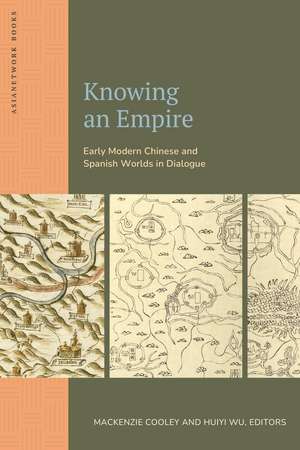Knowing an Empire: Early Modern Chinese and Spanish Worlds in Dialogue: ASIANetwork Books
Editat de Mackenzie Cooley, Huiyi Wuen Limba Engleză Paperback – 12 aug 2025
Knowing an Empire does not see the conveyance of information across an empire as a top-down process with an active center as a knowledge-maker. Instead, it amplifies a blend of voices that speak as much to imperial bureaucracy as to the rich local and Indigenous cultures, revealing these two early modern empires as diverse polities whose equilibria were constantly rebalanced among local powers. Comprised of 18 chapters, this edited collection reflects on the historical evolution and inner structures of the imperial epistemologies, as well as the many ways historians today read difangzhi and relaciones geográficas to understand the spatial, natural, and social order in both the Chinese and the Spanish empires. At once a comparative and a connected history, it places Chinese and Spanish imperial knowledge in the globalizing early modern world, highlighting the migration of people, goods, and ideas and revealing how these wide-ranging influences are reflected—or not—in the difangzhi and the relaciones. The book concludes by broadening our scope beyond China and Spain to reflect how other early modern empires, such as the Portuguese, failed to develop such systematized imperial genres.
With contributions from leading scholars across Latin American and Asian Studies, this book synthesizes political, environmental, and socio-economic history with historical anthropology to highlight parallel governance and knowledge structures. The contributors challenge conventional binaries of Western versus Eastern, and colonial versus non-colonial, presenting a nuanced perspective of early modern empires as dynamic, interconnected entities through the shared challenges of scale, diversity, and increasing globalization. Through these dialogues, Knowing an Empire illuminates the complex entanglement of ruling and understanding. This groundbreaking collection offers a highly innovative and dialogic approach to comparative studies of empires, with major implications for Asian, European, Latin American, transnational, and global history.
Preț: 384.00 lei
Nou
Puncte Express: 576
Preț estimativ în valută:
73.50€ • 79.87$ • 61.78£
73.50€ • 79.87$ • 61.78£
Carte nepublicată încă
Doresc să fiu notificat când acest titlu va fi disponibil:
Se trimite...
Preluare comenzi: 021 569.72.76
Specificații
ISBN-13: 9781643150765
ISBN-10: 1643150766
Pagini: 600
Ilustrații: 69 color images
Dimensiuni: 152 x 229 mm
Greutate: 0.45 kg
Editura: Michigan Publishing Services
Colecția Lever Press
Seria ASIANetwork Books
ISBN-10: 1643150766
Pagini: 600
Ilustrații: 69 color images
Dimensiuni: 152 x 229 mm
Greutate: 0.45 kg
Editura: Michigan Publishing Services
Colecția Lever Press
Seria ASIANetwork Books
Notă biografică
Mackenzie Cooley is Associate Professor of Early Modern History of Ideas at Hamilton College. Her books include The Perfection of Nature: Animals, Breeding, and Race in the Renaissance (University of Chicago Press, 2022) and Natural Things in Early Modern Worlds (Routledge, 2023).
Huiyi Wu is a historian of early modern Sino-European relationships and a permanent research fellow at the National Center of Scientific Research (CNRS) in France. She is the author of Tranduire la Chine au XVIIIe siècle (Translating China in the Eighteenth Century, Honoré Champion, 2017).
Huiyi Wu is a historian of early modern Sino-European relationships and a permanent research fellow at the National Center of Scientific Research (CNRS) in France. She is the author of Tranduire la Chine au XVIIIe siècle (Translating China in the Eighteenth Century, Honoré Champion, 2017).
Descriere
Revealing dynamic dialogues between early modern China and Latin America through a new methodology




